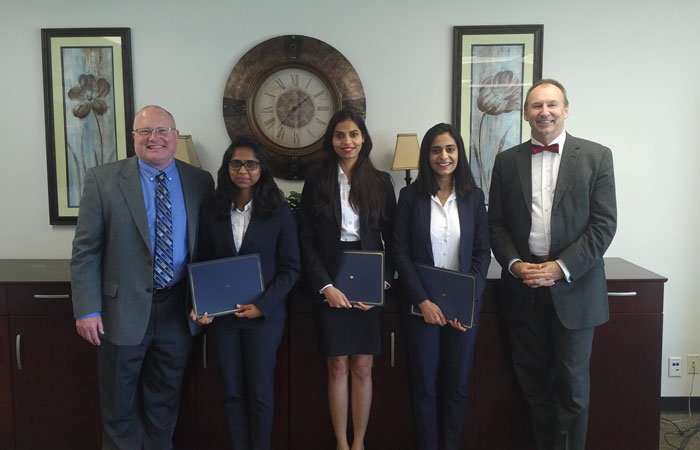Mission Possible: MHA students win ‘Transforming Galveston’ Case Competition
By: Sally Crocker

The mission was to “Transform Galveston” with strategies for improving chronic disease prevention and care among Galveston County Medicaid patients.
Accepting the challenge was a team of three MHA students from the UNTHSC School of Public Health: Amruta Sakhalkar, Ela Vashishtha and Sayali Ethape.
At the recent George McMillan Fleming Center for Healthcare Management’s 6th Annual Case Competition in Houston, the UNTHSC team’s presentation took first place for solutions addressing poor nutrition.
In the U.S., chronic diseases like obesity, cancer, heart disease, stroke and diabetes are among the leading causes of death and disability and are responsible for major limitations in daily living for almost one out of 10 Americans.
Although chronic diseases are among the most common and costly health problems, they are also the most preventable, by adopting healthy behaviors such as eating nutritious foods, being physically active and avoiding tobacco use and exposure.
Assuming the role of a Medicaid managed care organization, student teams were charged with developing proposals for a five-year plan to improve health outcomes for enrollees, lower costs and outline funding sustainability for five years and beyond.
Students were asked to consider barriers that might impact participants’ success in adopting healthier behaviors, including economic, social, education and community/neighborhood/food accessibility conditions.
“Our plan outlined methods to screen enrollees for malnutrition and hunger and to distribute food packets to those in need,” UNTHSC team member Ela Vashishtha said. “We also recommended drive-through food distribution centers for more remote areas of the community where healthy foods are not easily accessible.”
The team also proposed partnering with a local non-profit farmers market.
“Right now, Galveston’s farmers market operates two daytime locations on Thursdays and Sundays. Expanding to later weeknight hours could enable more people could visit the market without compromising their work schedules,” Vashishtha said.
Community gardens and backyard food cultivating initiatives were also suggested, as well as alliances connecting local farmers directly to schools and businesses through monthly food-ordering programs.
“The most important feedback we gained from the health care leaders evaluating our proposal was to link the nutritional initiatives with physical activities. Diet and exercise together will produce better outcomes,” Vashishtha said.





Social media